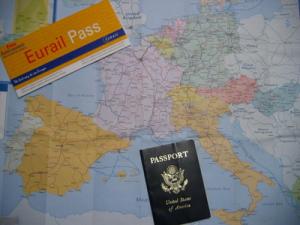
What kind of trip do you want? The answer is as important before you start buying plane tickets as it is once you've arrived in Amsterdam. Planning for a trip really depends on what you want to see, how long you have to travel, how you intend to get from place to place and ultimately, what you can see.
First, ask yourself: do I want to see as much of Europe as I can in "x" weeks? or, do I want to see as much of Germany as I can in "x" weeks? or, do I want to get to know Madrid over the course of "x" weeks/days. How you answer these questions will determine what kind of preparation you need to do.
Simple and easy
Work backwards. Let's say you want to see Madrid, and only Madrid. Well then, you will really only need to worry about purchasing a round trip plane ticket to and from Madrid. Rail passes won't be a concern for you (and never should be for anybody just traveling in Spain. Point-to-point ticket prices are generally going to save you money in Spain over buying a rail pass). Booking flights to other countries or cities is not an issue, and you only need a travel guidebook that has a lot of information on Madrid.
Complicating things
If you plan on spending all your time in Germany, but not in a specific city or town, your planning will be more demanding. You will have the round-trip airfare. of course, however, you will need to consider how you are going to get from city to city. Will you rent a car or will you take a train? Will you be seeing several cities, or just Berlin and Munich? If you plan on seeing only Berlin and Munich, then purchasing a point-to-point ticket may be the cheapest way to go. Should you be planning on flying into Berlin, traveling to Dresden then going to Leipzig to see your German cousin before you head south to Stuttgart, where they are hosting a modern art exhibit and finally ending up in Munich, after stopping off in Tübingen to drink at the student bar you spent your study-abroad experience in, a rail-pass will probably be a better idea. You’re also going to have to book more hotels or hostels, and carry a larger guidebook that covers all of Germany.
If it's your first time traveling overseas and you want to get the big picture, you will be dealing with all of the above concerns on a larger scale. Rail-passes need to cover every country you want to see. You need to have an idea of where you're going so that you end up in the city you're flying out of. Your guidebook should cover the whole of Europe.
Choose your own adventure
I found that starting with a tornado-type trip that took me all over Europe, finding what regions or countries appealed to me was the best. On the second trip, you can then concentrate on one country, see it in more depth, spend time in that one city (or surrounding area). This system works well, considering that the chances of having five weeks to travel Europe and the stamina to do it will most likely happen when you’re younger. As the years pass and time off from work limits your trip length more and more, your stays will become shorter and more focused; you won't have to put up with the strains of daily travel that older knees and bad backs can't handle.
How many sick days can you take? Understandably, how long you have to travel will play a major role in how much you will get to see. You can see London, Paris, Madrid, Barcelona, Cinque Terre, Rome, Florence, Interlaken, Venice, Prague, Munich, Berlin and Amsterdam in four to five weeks, and that's moving at a quick pace. Two weeks would be enough time to travel to three or four cities in Spain or Italy. Remember, Europe is small in relation to the U.S. Germany, for example, is about the size of Michigan.
The plan
It's best to sit down with pen and paper and ask yourself such questions as: What do I want to see? How much time do I have? Write down your answers. Guidebooks help, common sense is the key. A large city like Paris or Rome generally takes three to four days. (On my last trip I had one day to show my travel partner the major sites. Aside from missing the Pantheon by 30 minutes, we did it). Smaller cities take less time. You may find the beer prices in Budapest so reasonable, you decide to extend your stay. Once you list all the time you need for each country, add it up. Is it feasible in your time frame? If not, start crossing off the places that are not important this time around, or way out of the way. Remember, you will have to account for travel time. If most of your list has you in Italy and southern Spain, crossing London from your list might be the best idea. It'll be there when you return!
Once you have a list of locations that will fit into your time frame, cross out one more! You can always stick it back in later. Chances are that you will either like some location and stay longer than expected, or the French rail workers will go on strike and you will not be able to get out of the Netherlands and into Paris for a day or two.
With this list in hand you can start to think about even more important things: what kind of budget you have for beer, food and housing – in that order.
Christopher Cook currently resides in Tallahassee, Florida. He has lived and studied in Tübingen, Germany. Through his blog, he hopes to inspire others to get out there and see Europe.